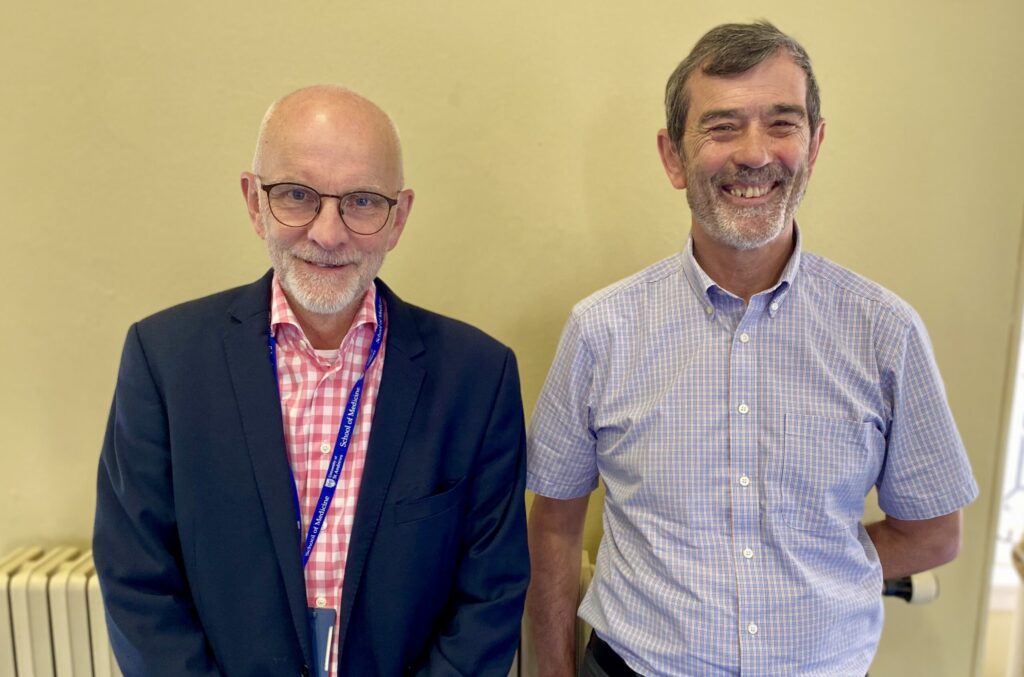Annual Research Symposium 2024

The School of Medicine hosted its Annual Research Symposium on 30 August in Upper College Hall.
The day began with a warm welcome from outgoing Director of Research (DoR) Prof. Frank Sullivan, who provided an update on the latest research developments within the School. Highlights from the past year included expanded NHS Fife and industry involvement in School research, a successful CSO programme grant bid, and several well-received conferences hosted by the School. Prof. Sullivan thanked his colleagues for their contributions to these achievements and was in turn thanked by Dean of Medicine Prof. David Crossman for his exemplary leadership during his tenure as DoR.
Mackenzie Institute for Early Diagnosis Director Prof. Peter Donnelly then summarised the impressive range of Institute activities in AY 23/24. This included a new collaboration with Scottish Brain Sciences, cutting-edge dementia research by the Bioinformatics Unit, and the first Evidence-Based Early Diagnosis Conference (EBED), hosted by the Institute and now scheduled to recur on a biannual basis.
The first talks of the morning were then delivered by Carol Porteous (Patient and Public Involvement Advisor, University of Edinburgh) and Dr Rajendra Raman (Accident & Emergency Doctor, NHS Fife). Ms Porteous outlined the importance of patient and public involvement in all aspects of medical research, while Dr Raman spoke on the need to continually reassess the evidence base behind emergency medicine treatment recommendations.
After a coffee break, attendees reconvened to hear from members of each of the School’s four research divisions. Research Fellow in Medical Statistics Robin Alexander (Population and Behavioural Science Division) discussed her work examining the impact of birth mode on perinatal mortality in spontaneous preterm breech labour. PhD student Struan Donachie (Cellular Medicine Division) described his research on the hypothalamic epigenetic mechanisms that regulate female fertility. Research Fellow Dr Xi-Ning Wang (Education Division) introduced her team’s work on an extended-reality clinical simulation scenario and AI chatbot for use in medical education, while PhD student Marianna Leite De Avellar (Infection and Global Health Division) showcased her research on antimicrobial photodynamic therapy.
The afternoon featured presentations from newer School staff members. Professor of Medicine Deborah Williamson presented on her application of genomics to infectious disease detection, while Industry Principal Research Fellow Dr Craig Robertson discussed the biomedical engineering challenges posed by the emerging field of oculomics. SCREDS Clinical Lecturer Dr Andrew Hall then outlined the positive impact of Scottish orthopaedic fellowships on medical research and population health.
The symposium concluded with poster prizes and a much-anticipated Dragon’s Den session, where researchers pitched their ideas to a panel of ‘dragons’. Third-year BSc (Hons) students Aseem Gupta and Lewis Watt won the undergraduate prize for their poster on ‘Methods of increasing physical activity after completion of Exercise Referral Schemes.’ Research Fellow Victor Velasco Pardo won the postgraduate researcher/staff prize for his poster on ‘Prediction of brain amyloid positivity from blood-based biomarkers to accelerate Alzheimer’s disease clinical research,’ a study co-authored by Victor, bioinformaticians Dr Marco Ferreira Fernandes and Dr Paul Johnston, and Prof. Peter Donnelly. At the Dragon’s Den session, PhD students Mark Kelly and Struan Donachie each won funding for their proposals.
Mark’s project will seek to develop a method for performing liquid chromatography mass spectrometry (LC-MS) metabolomics on paraffin-embedded tissue samples. LC-MS metabolomics – commonly performed on plasma, serum, and urine – allows researchers to measure the concentration of hundreds of metabolites simultaneously, accelerating the identification of those that could serve as disease biomarkers. Finding a means of applying this method to paraffin-embedded tissue samples – one of the most accessible and cost-effective sample types to obtain – would provide a far less invasive and expensive technique for LC-MS analysis.
Struan’s work will use a cutting-edge imaging technique called whole-tissue clearing to explore how the hormonal changes accompanying menopause affect the melanocortin 4 receptor (Mc4R) in mice. Mc4R is a protein that regulates energy homeostasis, food intake, and body weight, and the inactivation of its gene has been shown to lead to obesity in humans. Whole-tissue clearing turns tissue transparent while preserving its neuronal and protein structures. Struan plans to use this method to examine the whole brain and quantify neuronal circuits in their entirety. This will, he hopes, provide a far more accurate picture of how menopause-related hormonal changes affect Mc4R.
Congratulations to the day’s prizewinners and all those who shared their exciting work with their colleagues; we look forward to hearing how your projects have progressed at next year’s symposium!